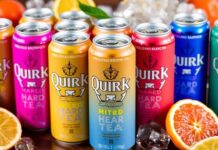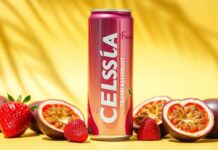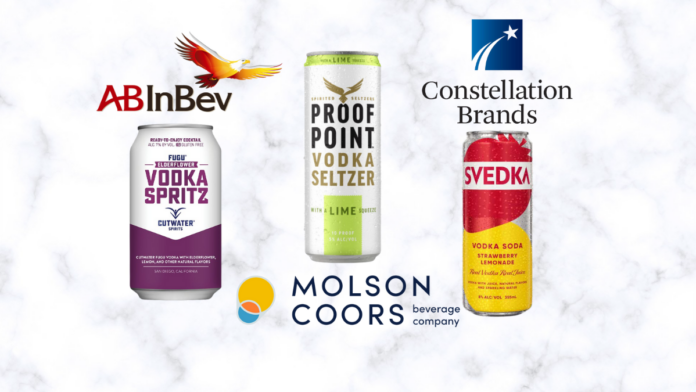Big Beer may soon become an unlikely ally in the spirits industry’s ongoing fight to lower excise taxes on canned cocktails. Brewing giants, many of which have long since been opposed to lowering taxes on spirits, now have more reasons than ever before to support legislation in favor of doing just that.
As ready-to-drink (RTD) beverages continue their impressive run on the market, almost all of the world’s leading breweries have begun producing canned cocktails. Now, with the success of their own canned cocktail brands at stake, softening their stance on spirits taxation would be mutually beneficial to both industries.
Excise taxes are duties imposed on goods during manufacturing instead of at the point of sale. Additional taxes make products more expensive at retail and higher prices can often result in lower demand. Historically, excise taxes have worked to discourage the purchase of certain goods and behaviors.
Taxing spirits at a higher rate than beer is nothing new. It has been happening for nearly a century as a result of Prohibition era morals and perceptions leaking over into post-Prohibition legislation. Because spirits contain more alcohol by volume than beer or wine, the long standing argument is they should be taxed and regulated more aggressively.
Until now the outdated laws have unintentionally provided the beer industry with a competitive advantage. However, the pandemic brought about a shift in consumer drinking habits resulting in the rise of canned cocktails. Beer brands suffered major on-premise losses, while the RTD category enjoyed unprecedented off-premise success.
“This excessive tax burden is unfair to consumers and creates a steep hurdle for many small craft distillers who want to enter this growing category,” stated Lisa Hawkins, the Senior Vice President of Public Affairs for the Distilled Spirits Council of the United States, in a recent interview with CNBC. “States are taking a closer look at this issue to provide consumers with more convenient and equal access to spirits-based RTDs, and to ensure these products are being taxed fairly.”
Earlier this year Nebraska and Michigan created laws that lower the excise taxes levied on canned cocktails. Pennsylvania and New Jersey have begun the process as well. Both currently have bills at their state legislatures waiting to be passed. Residents of West Virginia, Washington, Vermont, Hawaii and North Carolina will see bills rolled into next year’s sessions.
Over the past two years, brewers large and small have scrambled to get onboard with canned cocktails. Even the titans of the brewing industry now have at least one canned cocktail in their portfolio.
Anheuser-Busch InBev
Cutwater Spirits boasts more than twenty varieties of canned cocktails featuring real spirits. The brand has won more than 1,000 awards for its diverse catalog.
Anheuser-Busch, which brews Budweiser, Bud Light, and Rolling Rock among others, acquired Cutwater Spirits in 2019 and has continued to grow the brand’s cocktail offerings. Former AB InBev CEO, Carlos Brito, praised Cutwater’s performance during a recent earnings call, “…It’s about beyond beer, like Cutwater. Cutwater, for example, growing twice the growth of RTD cocktails.” Lowering excise taxes on spirits would help companies like Anheuser-Busch confidently expand their canned cocktail lines while creating a more affordable price point for consumers.
Anheuser-Busch isn’t the only industry titan with a new reason to consider supporting lowered spirits taxes.
Molson Coors Beverage Company
Molson Coors, which famously brews Coors Light, Miller Lite, Blue Moon and more, is also the owner of Proof Point, a new canned cocktail brand featuring real spirits and real juice.
Molson announced its Q2 earnings in July, reporting its best quarterly growth in 10 years. Much of that growth can be attributed to the company’s heavy investment in the RTD category. During the Q2 earnings call Molson’s CEO, Gavin Hattersley, boasted about the category’s success, “RTD beverages are…an emerging and fast-growing segment. In fact, RTD sales really outpaced spirits, and that gap is only going to likely widen in the future. And competing in this space is a natural fit for companies like ourselves.”
Molson Coors has heavily embraced the Beyond Beer movement. Last year the company even changed its name from Molson Coors Brewing Co. to Molson Coors Beverage Company. Supporting legislation aimed at lowering excise taxes on spirits would be another strategic way for the alcohol beverage behemoth to support its Beyond Beer agenda.
Constellation Brands
Constellation Brands owns SVEDKA Vodka which launched SVEDKA Vodka Sodas, a line of canned cocktails, earlier this year. Constellation might be known for its popular beer brands such as Corona and Modelo, but the company also has many prominent spirits brands to its name including High West Whiskey, Nelson’s Green Brier Distillery, Casa Noble Tequila, and Mi Campo Tequila.
A better tax rate for canned cocktails could easily open the door to lowered taxes throughout the spirits industry, a win for a spirits-heavy company like Constellation. The change would also make it easier for more Constellation brands to explore canned and RTD beverages.
As RTD beverages become more mainstream and brewers continue to enter the RTD world, it is only a matter of time before Big Beer gets behind efforts to lower excise taxes on canned cocktails.
- Seltzer Category Expanded for 2022 Craft Beer Marketing Awards - February 11, 2022
- Drifter Expands Portfolio with Nordic-Style Gin - January 18, 2022
- Tilray Acquires Green Flash and Alpine Beer - December 22, 2021














